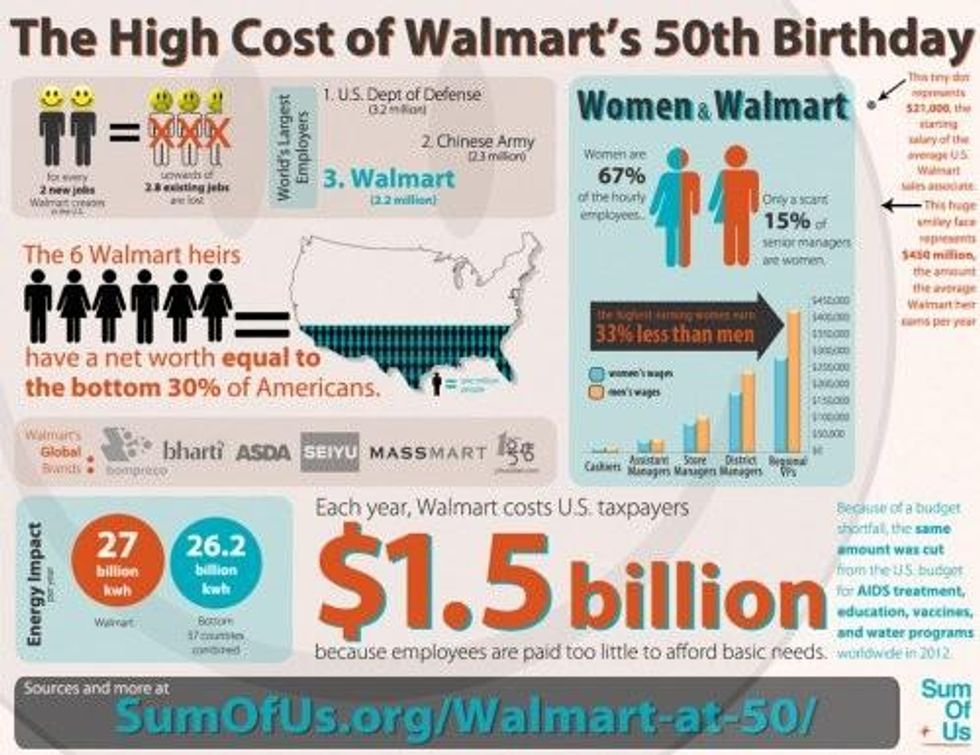

SUBSCRIBE TO OUR FREE NEWSLETTER
Daily news & progressive opinion—funded by the people, not the corporations—delivered straight to your inbox.
5
#000000
#FFFFFF
To donate by check, phone, or other method, see our More Ways to Give page.


Daily news & progressive opinion—funded by the people, not the corporations—delivered straight to your inbox.
Retail giant Walmart, the second-largest corporation on the planet, has not gotten the scrutiny it deserves for "facilitating America's industrial decline," says a report released Monday from Demos.
Retail giant Walmart, the second-largest corporation on the planet, has not gotten the scrutiny it deserves for "facilitating America's industrial decline," says a report released Monday from Demos.
The report, "NOT Made in America: Top 10 Ways Walmart Destroys US Manufacturing Jobs" comes as Walmart celebrates its 50th anniversary this week and is on the heels of a weekend protest in which 4,000 Walmart workers and supporters marched in Los Angeles under the banner "Walmart = Poverty" while similar marches took place in New York, Chicago and other cities.
Demos' report highlights ten ways in which Walmart has played a role decline of American industry:
1. Buying billions of goods that weren't made in America.
2. Pushing U.S. companies to move their factories overseas.
3. Making it easier for other U.S. retailers to buy from foreign factories.
4. Forcing layoffs among its U.S. suppliers.
5. Promoting domestic sweatshops.
6. Squeezing U.S. manufacturers out of business.
7. Discouraging American innovation.
8. Driving competitors to squeeze manufacturing.
9. Lobbying for policies that make it easier to move U.S. jobs overseas.
10. Making growing inequality the accepted norm
As Local economy advocate Stacy Mitchell writes, "Walmart's history is the story of what has gone wrong in the American economy. Wages have stagnated. The middle class has shrunk. The ranks of the working poor have swelled. Whatever we may have saved shopping at Walmart, we've more than paid for it in diminished opportunities and declining income."

* * *

Dear Common Dreams reader, The U.S. is on a fast track to authoritarianism like nothing I've ever seen. Meanwhile, corporate news outlets are utterly capitulating to Trump, twisting their coverage to avoid drawing his ire while lining up to stuff cash in his pockets. That's why I believe that Common Dreams is doing the best and most consequential reporting that we've ever done. Our small but mighty team is a progressive reporting powerhouse, covering the news every day that the corporate media never will. Our mission has always been simple: To inform. To inspire. And to ignite change for the common good. Now here's the key piece that I want all our readers to understand: None of this would be possible without your financial support. That's not just some fundraising cliche. It's the absolute and literal truth. We don't accept corporate advertising and never will. We don't have a paywall because we don't think people should be blocked from critical news based on their ability to pay. Everything we do is funded by the donations of readers like you. Will you donate now to help power the nonprofit, independent reporting of Common Dreams? Thank you for being a vital member of our community. Together, we can keep independent journalism alive when it’s needed most. - Craig Brown, Co-founder |
Retail giant Walmart, the second-largest corporation on the planet, has not gotten the scrutiny it deserves for "facilitating America's industrial decline," says a report released Monday from Demos.
The report, "NOT Made in America: Top 10 Ways Walmart Destroys US Manufacturing Jobs" comes as Walmart celebrates its 50th anniversary this week and is on the heels of a weekend protest in which 4,000 Walmart workers and supporters marched in Los Angeles under the banner "Walmart = Poverty" while similar marches took place in New York, Chicago and other cities.
Demos' report highlights ten ways in which Walmart has played a role decline of American industry:
1. Buying billions of goods that weren't made in America.
2. Pushing U.S. companies to move their factories overseas.
3. Making it easier for other U.S. retailers to buy from foreign factories.
4. Forcing layoffs among its U.S. suppliers.
5. Promoting domestic sweatshops.
6. Squeezing U.S. manufacturers out of business.
7. Discouraging American innovation.
8. Driving competitors to squeeze manufacturing.
9. Lobbying for policies that make it easier to move U.S. jobs overseas.
10. Making growing inequality the accepted norm
As Local economy advocate Stacy Mitchell writes, "Walmart's history is the story of what has gone wrong in the American economy. Wages have stagnated. The middle class has shrunk. The ranks of the working poor have swelled. Whatever we may have saved shopping at Walmart, we've more than paid for it in diminished opportunities and declining income."

* * *

Retail giant Walmart, the second-largest corporation on the planet, has not gotten the scrutiny it deserves for "facilitating America's industrial decline," says a report released Monday from Demos.
The report, "NOT Made in America: Top 10 Ways Walmart Destroys US Manufacturing Jobs" comes as Walmart celebrates its 50th anniversary this week and is on the heels of a weekend protest in which 4,000 Walmart workers and supporters marched in Los Angeles under the banner "Walmart = Poverty" while similar marches took place in New York, Chicago and other cities.
Demos' report highlights ten ways in which Walmart has played a role decline of American industry:
1. Buying billions of goods that weren't made in America.
2. Pushing U.S. companies to move their factories overseas.
3. Making it easier for other U.S. retailers to buy from foreign factories.
4. Forcing layoffs among its U.S. suppliers.
5. Promoting domestic sweatshops.
6. Squeezing U.S. manufacturers out of business.
7. Discouraging American innovation.
8. Driving competitors to squeeze manufacturing.
9. Lobbying for policies that make it easier to move U.S. jobs overseas.
10. Making growing inequality the accepted norm
As Local economy advocate Stacy Mitchell writes, "Walmart's history is the story of what has gone wrong in the American economy. Wages have stagnated. The middle class has shrunk. The ranks of the working poor have swelled. Whatever we may have saved shopping at Walmart, we've more than paid for it in diminished opportunities and declining income."

* * *
